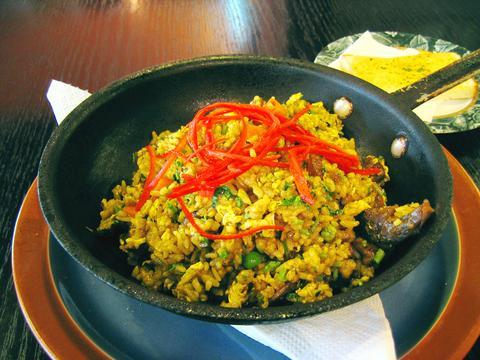Indian Fans and its predictably kitsch wall hangings and assorted nick-knacks related to India first appeared on Taipei's fashionable Yungkang food-street two years ago. It opened a second outlet a stone's throw from the more up-market Dinghao shopping neighborhood last summer.
The place must be doing something right in order to open its second branch, but what that is leaves this reviewer perplexed. Like all too many locally owned restaurants that attempt to pass themselves off as foreign eateries and fall flat, if not so low that the gutter is the best place for them, Indian Fans is a sham.
While some bright spark had the affront to boast "best Indian curry in Taipei" on a flyer advertising the place at the recent Computex in Taipei, the truth is very different. Indian Fans serves up some of the worst curry to be found in Taipei. Sure, the decor and design are pleasant enough, but this is an eatery not a museum piece.

PHOTO: GAVIN PHIPPS, TAIPEI TIMES
The menu includes such fancy sounding fare as Kashmir chicken curry, Madras beef curry, Rajasthan mutton curry and Punjab mixed vegetable curry, but there's not a naan bread in sight. Each dish is served with a plate of rice -- the local sticky variety as opposed to the fluffy Indian type -- an odd assortment of vegetables, and comes with a complementary salad bar.
This reviewer sat down for what he thought would be a lamb pulao (NT$249), but was instead served a wok-fried plate of lamb fried rice filled with frozen carrots, peas and, of course, the ubiquitous corn. While I attempted to wade through the fried rice and accompanying grease and at the same time discern its flavor, a waitress was kind enough to pop a side dish of garlic bread made from a single slice of white toasted bread on the table.
Sadly the food's flavorlessness and the limp slice of garlic bread proved all too much and I was forced to beat an early retreat from Indian Fans with my meal left unfinished.
I opted for my complementary beverage to go, but should have declined the cup of iced Indian Masala tea as it proved as bad as the meal. Traditionally drunk as a pick-me-up, the bastardized version of this otherwise great brew served up at Indian Fans had the reverse effect. Instead of leaving me refreshed it left a rancid taste in my mouth.
The bottom line for Indian Fans is simple: If you're familiar with and enjoy Indian fare then don't go anywhere near the place!

In the March 9 edition of the Taipei Times a piece by Ninon Godefroy ran with the headine “The quiet, gentle rhythm of Taiwan.” It started with the line “Taiwan is a small, humble place. There is no Eiffel Tower, no pyramids — no singular attraction that draws the world’s attention.” I laughed out loud at that. This was out of no disrespect for the author or the piece, which made some interesting analogies and good points about how both Din Tai Fung’s and Taiwan Semiconductor Manufacturing Co’s (TSMC, 台積電) meticulous attention to detail and quality are not quite up to

It is one of the more remarkable facts of Taiwan history that it was never occupied or claimed by any of the numerous kingdoms of southern China — Han or otherwise — that lay just across the water from it. None of their brilliant ministers ever discovered that Taiwan was a “core interest” of the state whose annexation was “inevitable.” As Paul Kua notes in an excellent monograph laying out how the Portuguese gave Taiwan the name “Formosa,” the first Europeans to express an interest in occupying Taiwan were the Spanish. Tonio Andrade in his seminal work, How Taiwan Became Chinese,

April 21 to April 27 Hsieh Er’s (謝娥) political fortunes were rising fast after she got out of jail and joined the Chinese Nationalist Party (KMT) in December 1945. Not only did she hold key positions in various committees, she was elected the only woman on the Taipei City Council and headed to Nanjing in 1946 as the sole Taiwanese female representative to the National Constituent Assembly. With the support of first lady Soong May-ling (宋美齡), she started the Taipei Women’s Association and Taiwan Provincial Women’s Association, where she

Mongolian influencer Anudari Daarya looks effortlessly glamorous and carefree in her social media posts — but the classically trained pianist’s road to acceptance as a transgender artist has been anything but easy. She is one of a growing number of Mongolian LGBTQ youth challenging stereotypes and fighting for acceptance through media representation in the socially conservative country. LGBTQ Mongolians often hide their identities from their employers and colleagues for fear of discrimination, with a survey by the non-profit LGBT Centre Mongolia showing that only 20 percent of people felt comfortable coming out at work. Daarya, 25, said she has faced discrimination since she